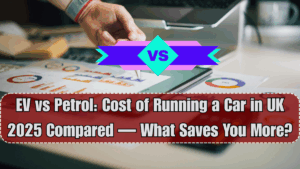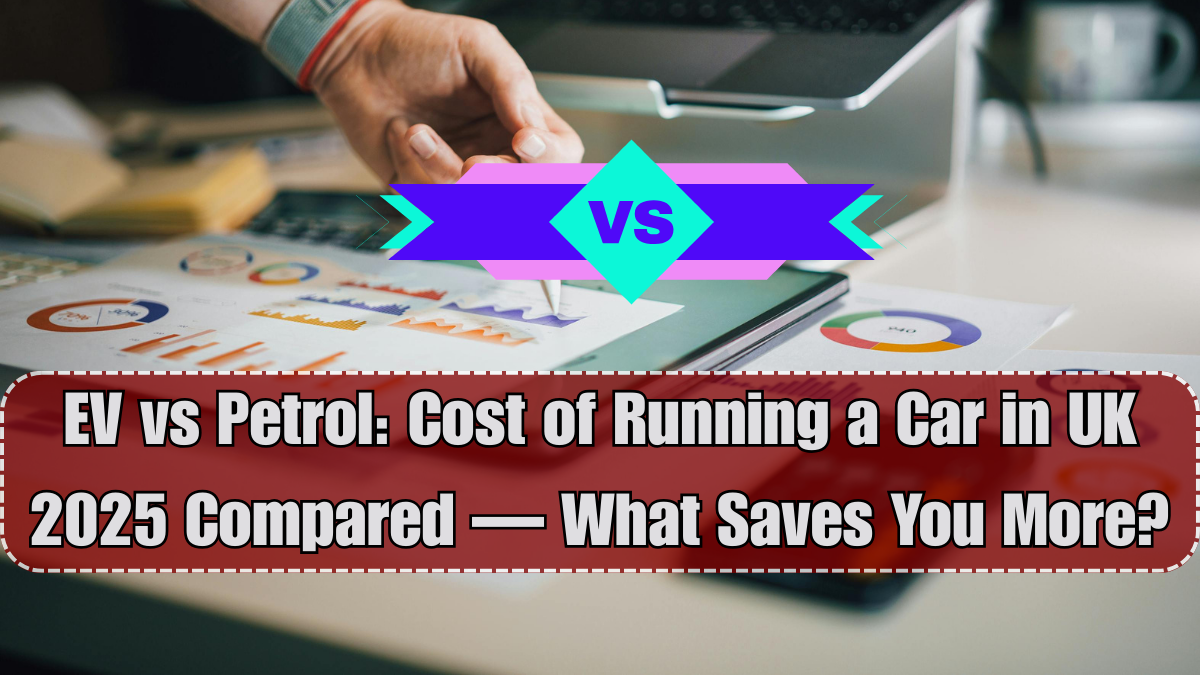The UK Petrol vs EV Cost Comparison 2025 is more relevant than ever as fuel prices remain volatile while electric vehicle (EV) adoption continues to rise. British drivers are now actively comparing whether to stick with traditional petrol-powered vehicles or make the switch to electric cars. With updated government data and market insights, 2025 brings real-time answers.
Today’s drivers are not just thinking about the environment but about their wallets. With energy prices stabilising and public charging options expanding, electric cars are increasingly becoming the cost-effective choice for daily commuting and long-distance travel alike.

Annual Running Cost: EV vs Petrol in the UK – 2025
Let’s start by comparing the annual costs of owning and running a petrol car versus an electric vehicle for a UK driver in 2025. These costs include fuel/charging, road tax, maintenance, and insurance.
Table: Yearly Ownership Cost Comparison (2025)
| Category | Petrol Car (Average) | Electric Car (Average) |
|---|---|---|
| Fuel/Charging | £1,650 | £640 |
| Insurance | £860 | £815 |
| Road Tax | £180 | £0 (until 2025 end) |
| Maintenance/Repairs | £470 | £280 |
| Annual Total | £3,160 | £1,735 |
According to the UK petrol vs EV cost comparison 2025, an EV driver can save up to £1,400 per year in total running costs.
Fuel Cost vs Electric Vehicle Savings Explained
The biggest advantage in fuel vs EV UK cost comparison is the massive difference in fuel expenses. While a petrol car costs approximately £0.18 per mile, an electric car costs closer to £0.06 per mile when charged at home.
Here’s a quick breakdown:
-
Petrol (avg. £1.58/litre) gives 12–14p per mile
-
Home charging (avg. £0.28/kWh) gives around 5–7p per mile
-
Public charging may vary, but off-peak rates remain cheaper than fuel
With the average UK commuter driving about 9,000 miles a year, switching to EVs leads to real savings in 2025.
Additional Savings for EV Owners in 2025
The EV savings go beyond fuel. Drivers benefit from several direct and indirect cost advantages in the UK this year:
-
No Congestion Charges in cities like London (for EVs)
-
Free or discounted parking in EV zones
-
Lower maintenance costs due to fewer moving parts
-
Cheaper MOTs for EVs under 3 years
-
Government incentives for home charger installation
These benefits make EVs a smart investment for both city and rural drivers.
When Does Petrol Make More Sense?
Although the UK petrol vs EV cost comparison 2025 shows clear EV benefits, petrol cars still have some advantages:
-
Lower upfront purchase price for budget petrol vehicles
-
More familiar infrastructure in remote areas
-
No charging wait times or dependency on plug-in access
-
Easier to find used petrol models under £5,000
However, as more budget EVs enter the UK market in 2025, these petrol advantages are gradually reducing.
FAQs
How much can I save yearly by switching from petrol to EV in 2025?
You can save around £1,400 per year in running costs based on current average mileage and fuel/energy rates.
Is EV insurance cheaper than petrol car insurance in 2025?
Slightly. On average, EV insurance is £45–£60 less annually, depending on the model and location.
What about road tax for EVs in 2025?
Road tax remains £0 for EVs in 2025, but new tax rules are expected from 2026 onwards.
Are public charging stations more expensive than home charging?
Yes, public fast charging can cost more—up to 30–40p/kWh—but overnight home charging is still much cheaper.
Which is better for long-distance driving—EV or petrol?
Petrol still offers more refueling flexibility, but many new EVs now exceed 300 miles per charge with expanding charging networks.
Will EVs continue to be cheaper in the long run?
Yes, with lower fuel, tax, and maintenance costs, EVs provide better long-term value despite higher upfront prices.
Click here to know more.
